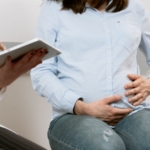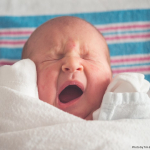When deciding whether or not to use psychotropic medications during pregnancy, we must consider the potential risks associated with untreated psychiatric illness in the mother. Untreated psychiatric illness during pregnancy can pose significant risks to both the mother and her unborn child. Previous studies have demonstrated a link between depression and/or anxiety in the mother and increased risk for preterm birth and low birth weight.
A recent study published in JAMA has used ultrasonography to monitor fetal growth during the critical rapid growth stage (CRGS). Between approximately 30 and 37 weeks of gestation, there is a critical period of rapid fetal growth during which fetal weight and stores of adipose tissue increase the most rapidly. Rapid growth during this stage contributes to newborns’ adaptation to the thermal and nutritional stressors after birth and plays a crucial role in the development and maturation of white matter in the fetal brain. Disruptions in fetal growth during this sensitive period of time may lead to increased vulnerability to cardiovascular disease, obesity, and neuropsychiatric disorders.
In this study, a total of 2,676 pregnant women were included, in which the mean (SD) age of mothers was 28.0 (4.4) years. Nearly half (48.4%) of the offspring were female. Measures of biparietal diameter (BPD), femur length (FL), and abdominal circumference (AC), and calculated estimates of fetal weight (EFW) were evaluated longitudinally, taking measurements at two time points: at 30 weeks of gestation (range, 28 to 32) and at 37 weeks of gestation (range, 35 to 39). Depressive symptoms in the mother were measured using the Edinburgh Postnatal Depression Scale (EPDS).
In this prospective cohort study, the researchers observed an association between maternal depressive symptoms during pregnancy with slower rates of fetal growth (femur length, abdominal circumference, and estimated fetal weight) between 30 and 37 weeks of gestation. These associations continued to be significant after adjusting for maternal demographic characteristics, socioeconomic status, lifestyle factors, and diet. Interestingly, they observed more pronounced reductions in fetal growth rate in female fetuses and in those born to wealthier families.
Clinical Implications
The findings of the current study are consistent with earlier studies reporting associations between maternal depressive symptoms and increased risk of low birth weight and reductions in fetal head circumference. Given the importance of this developmental stage for subsequent cognitive function in childhood and cardiovascular health in later life, this study suggests a potential pathway by which maternal depressive symptoms can contribute to adverse health outcomes in children.
Most importantly, this study provides additional evidence indicating that maternal depression during pregnancy may negatively affect fetal development. What we do not yet know is how treatment for depression may impact this trajectory. If we identify depression earlier in the course of pregnancy, would appropriate treatment prevent these deficits in fetal growth? Further research will help to answer this question; however, there are a number of studies indicating that treatment of depression during pregnancy may improve outcomes.
Ruta Nonacs, MD PhD
References
Zhang L, Li P, Ge Q, Sun Z, Cai J, Xiao C, Yu C, Nosarti C, Liao J, Liu Z. Maternal Prenatal Depressive Symptoms and Fetal Growth During the Critical Rapid Growth Stage. JAMA Netw Open. 2023 Dec 1;6(12):e2346018.







Leave A Comment